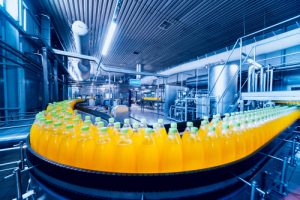Behind the scenes, an unsung hero silently powers many processes and applications in this industry: lubricated oil air compressors. These tough devices provide a consistent supply of compressed air, which powers pneumatic equipment and assures smooth operations.
Lubricated oil air compressors are essential for ensuring product integrity, satisfying demanding hygiene requirements, and increasing productivity from the processing and packaging phases through quality control and testing.
Applications of Lubricated Oil Air Compressors in the Food and Beverage Industry
Food Processing
The clean and dry compressed air produced by the air compressors minimises food product contamination during processing. This is especially significant in businesses where rigorous hygiene requirements must be fulfilled to assure food safety and prevent spoiling, such as meat processing, dairy production, and beverage manufacturing.
These compressors operate a range of pneumatic tools and equipment in food processing industries. Air-operated pumps are often used for transporting sanitary and regulated liquids such as sauces, oils, or syrups. Pneumatic mixers are used to consistently and effectively combine substances. Furthermore, air-powered conveyors are used to carry items through production lines, increasing automation and lowering manual labour.
Furthermore, they are frequently outfitted with features that assist simple maintenance and monitoring. Advanced control systems, oil level indicators, and remote monitoring capabilities, for example, allow operators to optimise compressor performance, plan maintenance chores, and reduce the danger of unexpected breakdowns.
Packaging
Air knives are used to dry products after they have been cleaned or rinsed. They provide a regulated and forceful jet of compressed air that eliminates excess moisture, particles, and impurities from the packed items’ surfaces. This ensures that the objects are dry and clean before proceeding to the next stage of packing, such as labelling or sealing. Dry surfaces are critical for protecting product integrity, preventing spoiling, and preserving the final packaged items’ quality and appearance.
Air cushions are inflated packing materials that protect and cushion food and beverage goods during shipping and handling. The compressors provide the compressed air needed to inflate these cushions, forming a protective barrier around the items. By cushioning shocks and vibrations, air cushions assist protect delicate things such as glass bottles or fragile food containers during travel.
Bottle & Can Cleaning

High-pressure air from lubricated oil air compressors has various benefits for bottles and can be clean. For starters, it offers a forceful and steady force to efficiently dislodge and eliminate impurities. This aids in the prevention of particle building or accumulation, such as dust, dirt, or microbes, which might affect the product’s quality.
Furthermore, they provide dependability and efficiency by maintaining a constant supply of compressed air for the bottle and can cleaning devices. In high-speed manufacturing lines, consistent and uninterrupted operation is critical to maintaining productivity and minimising downtime.
Cooling & Refrigeration
Cooling and refrigeration operations are crucial in the food and beverage sector for ensuring product quality and safety. Many food products are perishable and require careful temperature regulation to avoid decomposition and keep them fresh. This is particularly critical for dairy goods, meats, and fresh fruit.
They are essential components in the refrigeration cycle, which involves the transfer of heat from the food to the refrigerant, which is ultimately released into the surrounding environment. The air-driven refrigeration systems that push the refrigerant through the cycle are powered by lubricated oil air compressors.
The compressors also power the fans and blowers that circulate cool air throughout the facility’s refrigerated storage sections, providing uniform temperatures throughout.
Packaging Integrity Testing
By delivering the compressed air necessary for the testing processes, compressors play an important part in the package integrity testing process. For example, in pressure testing, the packaging is pressurised to a certain pressure level with compressed air and then monitored for any pressure decline over time. A pressure decrease signals a leak or flaw in the packing material, which might jeopardise the product’s quality and safety.
Air compressors must fulfil particular norms and requirements to guarantee that the compressed air used for package integrity testing is free of pollutants. ISO 8573 is a standard created by the International Organisation for Standardisation (ISO) that sets standards for compressed air quality.
The ISO 8573 standard defines several compressed air quality levels, including maximum allowable quantities of pollutants such as water, oil, and particulates. Compliance with such standards is critical in order to assure the safety and quality of food and beverage goods packaged and supplied to customers.
Conclusion
These have become critical components in the food and beverage industries, where they play critical roles in operations such as chilling, mixing, cleaning, and packaging. To maintain the quality and safety of the compressed air used in these applications, correct maintenance and lubrication practises must be followed, as well as regulatory regulations.
Lubricated oil air compressors may assist food and beverage producers achieve efficiency, consistency, and high-quality goods with the correct equipment and maintenance practises.